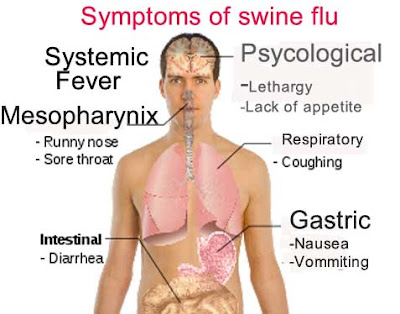 Swine flu also known as swine influenza is caused by a virus that is endemic in pig or swine.Strain that is found endemic in pig are called SIV or swine influenza virus.Influenza virusA and C are both endemic in humans and pigs.Swine flu pendemic has created a panic of the sorts all over the world.SIV can mutate and effect humans and as well as pigs.In the present outbreak the mutation seems to have occurred to SIV.People who are working in poultry farm or live near swine farm are at risk.
Swine flu also known as swine influenza is caused by a virus that is endemic in pig or swine.Strain that is found endemic in pig are called SIV or swine influenza virus.Influenza virusA and C are both endemic in humans and pigs.Swine flu pendemic has created a panic of the sorts all over the world.SIV can mutate and effect humans and as well as pigs.In the present outbreak the mutation seems to have occurred to SIV.People who are working in poultry farm or live near swine farm are at risk.The symptoms of swine flu in human beings are similar to that of common influenza eg. sore throat, fever, cough, body aches, headache, chills and fatigue. A few more patients than usual have also reported diarrhea and vomiting.
The CDC(center for disease control and prevention) reports that the symptoms and transmission of the swine flu from human to human is much like that of seasonal flu. Common symptoms include fever, lethargy, lack of appetite and coughing, while runny nose, sore throat, nausea, vomiting and diarrhea have also been reported.It is believed to be spread between humans through coughing or sneezing of infected people and touching something with the virus on it and then touching their own nose or mouth. Swine flu cannot be spread by pork products, since the virus is not transmitted through food. The swine flu in humans is most contagious during the first five days of the illness although some people, most commonly children, can remain contagious for up to ten days. Diagnosis can be made by sending a specimen, collected during the first five days, to the CDC for analysis.
Prevention from swine flu:Wash your hands with soap or alcohol based sanitizers and don’t touch your eyes,mouth etc without washing your hands.If possible use warm water along with soap to wash your hands after coming home.Don't hug your wife or children without taking a proper bath after you reach home.This prevents transmission of virus to children who have a weaker immune system.
Treatment of Swine flu:The CDC recommends the use of Tami flu (oseltamivir) or Relenza (zanamivir) for the treatment and/or prevention of infection with swine influenza viruses. The virus isolates that have been tested from the US and Mexico are however resistant to amantadine and rimantadine. If a person gets sick, antiviral drugs can make the illness milder and make the patient feel better faster. They may also prevent serious flu complications. For treatment, antiviral drugs work best if started soon after getting sick (within 2 days of symptoms).


